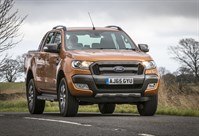Ford Ranger (2011 – 2022) Review
Ford Ranger (2011 – 2022) At A Glance
The Ford Ranger is a rugged and durable workhorse built in the same mould as pick-ups found in America, with muscle car styling and big load carrying potential. Like its stateside cousins, the Ranger is strong, with a 3.5 tonne towing limit. It is impressive off-road too, which makes it ideal for those who regularly need to take one-tonne payloads off the beaten track.
The third-generation Ranger was introduced in 2011 and initially came with a 2.2-litre - with 125PS or 150PS - alongside a more powerful 200PS 3.2-litre turbodiesel. In 2013 Ford gave the 2.2 turbodiesel a small power increase, with 130PS or 160PS. In 2019, the 2.2 diesel was replaced with the 2.0-litre EcoBlue diesel with 170 or 213PS and the option of a 10-speed automatic gearbox.
Good to drive in all conditions, the Ranger benefits from smooth and responsive controls that make it an easy drive on busy motorways or twisty B roads, even with a fully laden trailer in tow. It is good off-road when fitted with four-wheel drive, with high and low ratio gearing that make is easy to tackle steep ruts and inclines.
All models get a large loadbed, with the choice of single, super or double cab bodystyles. Single cab models will carry the most - a maximum of 1269kg - while double cabs will take around 1100kg. Getting into the loadbay is easy and the wide opening makes it simple for fork lift drivers to access.
Ford offers a wide range of tonneau covers, shutters and bedliners to protect your pick-up from damage and kept it secure. There is a range or factory-fit hardtop covers too, which effectively transforms the back of the Ranger into a panel van. Maximum towing capacities were upgraded from 3.3 tonnes to 3.5 tonnes as part of the 2013 facelift.
The cabin is well-made and comfortable with a spacious and durable interior that genuinely feels like it's built to cope with everyday working life. Finding a good driving position is easy and even entry-level models get comfortable and well-padded cloth seats. Double cab models will easily carry four adults and, as you'd expect, things get a bit more luxurious as you move up the trim levels and the range-topping Wildtrak getting leather seats, soft-touch trims and a large eight-inch touchscreen.
The Ford Ranger’s credentials as a workhorse are unquestionable – especially when you factor in the 2013 updates - but it does suffer from a lack of refinement. Especially when compared to the Nissan Navara and Volkswagen Amarok. That said, if you want a heavy duty workhorse, capable of cutting it off-road and moving big loads, few pick-ups come close to matching the Ranger.
Driving the Ford Ranger (2011 – 2022)
A 3.2-litre, five-cylinder turbodiesel with 200PS is the most powerful engine in the Ford Ranger, with 470Nm of torque on hand to help the Ranger surge off the line and overtake slower traffic.
The 3.2-litre motor feels very strong and potent, but is vocal with lots of diesel clatter at start-up and under hard acceleration. That said, it's the best engine in the Ranger line-up.
All of the 3.2-litre models come with four-wheel drive as standard, which helps them make light work of heavy-going off-road conditions. It also makes it an ideal tow vehicle thanks to its low-rev shove and a maximum towing capacity of 3350kg with a braked trailer. This towing limit was raised to 3500kg as part of the 2013 facelift.
The 3.2-litre engine also gained improved fuel economy in 2013 from 29.7mpg to 34.0mpg while CO2 emissions were lowered from 249g/km to 218g/km. If you opt for the six-speed automatic economy drops to 31.7mpg while emissions rise to 234g/km, although the optional automatic makes an equally good job of driving the Ranger as the standard six-speed manual.
At launch the Ranger was initially offered with a 2.2-litre - with 125PS or 150PS. However, this was increased slightly in 2013 to 130PS or 160PS. Running costs were also improved for the 130PS unit, from 37.2mpg and 199g/km of CO2 to 43.5mpg and 171g/km.
Even with the automatic gearbox fitted, the 160PS 2.2-litre turbodiesel delivers a claimed 35.3mpg and 209g/km CO2 emissions. These are the figures for the double cab version, but if you choose the much more workmanlike single cab model, you can expect an official 38.7mpg and 191g/km to make it a more affordable choice.
Given the choice, we'd recommend spending more for the 3.2-litre unit as the 2.2-litre engine is prone to feeling lethargic when pushed. Both of the engines lack refinement though, with lots of noise breaking into the cabin. That said, they're smooth to drive, with predictable power delivery and all of the other controls are light and well matched.
In 2019, 2.2 diesel was phased out of production and replaced with the 2.0-litre EcoBlue diesel from the Transit. This four-cylinder is offered with a single turbo (170PS) or a twinturbo (213PS).
Most Rangers get four-wheel drive as standard and it is here that the Ford really impresses, with superb off-road ability. The switch between two-wheel and four-wheel drive can be made on the move, while the Ranger also boasts low-ratio gearing for tackling really tough ruts and inclines.
From 2013 Ford also added hill decent control and hill hold assist as options, along with an electronic diff to give the Ranger better traction in heavy mud or snow.
Ford Ranger (2011 – 2022) interior
There’s a feeling of invincibility when you’re sat behind the steering wheel of the Ford Ranger. It has that high-set driving position that gives an excellent all-round view, regardless of which cab configuration you choose. The driver’s seat is easily adjusted to provide ideal comfort and the steering wheel also moves for height adjustment.
Some of the cabin plastics may be more utilitarian than Ford’s passenger cars, but the Ranger is well made and feels well constructed when compared to some of the competitions. It’s not the quietest place to sit and while away a journey though, with lots of wind, road and engine noise penetrating the cabin.
As with the exterior, the dash has more than a hint of American SUV and pick-up in its look. It’s not so much glitzy as just a bit more upbeat than some of the other pick-ups in the market. We like it and the Ranger’s instruments and controls are all very easy to fathom and use when driving without the need to take your eyes off the road to locate what you need. A typical Ford dash and driver environment.
The gear lever for the manual gearbox is set quite high in the centre console, which makes it easy to reach for any size of driver. Top-spec Wildtrak models come with a reversing camera mounted in the rear view mirror, which is a simple, neat way of installing this most useful device. It offers a good view of what’s behind the Ranger and makes backing into tight space a real cinch.
The Wildtrak also comes with navigation, air conditioning, chunky 18-inch allow wheels and two-tone fabric seats. Good as all of this is to have, though, the Wildtrak is perhaps aimed more at leisure than serious work use.
For business users looking to balance the books and comfort, the entry-level XL offers ESP traction control, hill start assist and trailer sway control. There are also twin front, side and curtain airbags, as well as a driver’s knee airbag but little in the way of creature comforts. For this reason, we’d recommend moving up to the XLT that comes with Ford’s Quickclear windscreen, Bluetooth connection and steering wheel controls for the CD stereo. For the Limited, Ford adds a third 12v power socket and rear parking sensors.
If you choose the super cab model, you get two rear-hinged doors that open to allow access to the space behind the front seats that acts as additional storage. If you need to carry more than one passenger, the double cab has two proper doors that open in the same orientation as the front pair.
They open to reveal a bench seat for three occupants and each has a three-point seat belt. There’s reasonable leg and headroom in the back seat of the Ranger double cab, putting it ahead of most rivals in this respect.
Behind the cab lies a load bed that can easily accommodate a Euro pallet and considerably heavier loads than much of the competition. With a maximum payload of 1269kg depending on which model you choose from, it’s a heavy duty workhorse.
The tailgate drops down flat and flush with the load bed, making it simple to heft in heavy items. Four load hooks help keep items in place, while an optional load bed tray will keep it from becoming scuffed and damaged.
The tailgate can be locked separately to the passenger cab and Wildtrak models come with a lockable roller shutter as standard and this is an option for other trims. There’s also a 12v power socket in the load bed of all Ranger models, while a tow bar is an option across the range. Depending on the model of Ranger, it can tow between 2500kg and 3500kg.
Ford Ranger (2011 – 2022) models and specs
| Dimensions | |
|---|---|
| Length | 5075–5359 mm |
| Width | 1715–1850 mm |
| Height | 1620–1850 mm |
| Load Volume | 1.2–1.8 m3 |
| Miscellaneous | |
|---|---|
| Kerb Weight | 1610–2233 kg |
| Payload | 900–1394 kg |
| Warranty | 36/60,000 12/Unlimited |
| Servicing | 6,000/12 Months |
Chassis Cab
| Version | List Price | MPG | |
|---|---|---|---|
| XL 2.5 TDCi 143PS | £15,900 | - | Details |
Double Cab
Double Cab Pick Up
| Version | List Price | MPG | |
|---|---|---|---|
| 2.2 TDCi Limited 1 Auto 4X4 | £24,145 | 35.3 mpg | Details |
| 3.2 TDCi 200 Limited 1 4X4 | £24,095 | 34.0 mpg | Details |
| 3.2 TDCi Wildtrak | £25,395 | 34.0 mpg | Details |
| 3.2 TDCi Wildtrak Auto | £26,245 | 31.7 mpg | Details |
Regular Cab
| Version | List Price | MPG | |
|---|---|---|---|
| Regular Cab Base 2.2TDCi 125 | £16,795 | 37.2 mpg | Details |
| Regular Cab XL 2.2 TDCi 160 | £18,095 | 43.5 mpg | Details |
| Regular Cab XL 2.2TDCi 125 | £17,070 | 37.2 mpg | Details |
| Regular Cab XL 2.2TDCi 125 4x2 | £15,333 | 38.7 mpg | Details |
| Regular Cab XL 2.2TDCi 150 | £17,570 | 36.2 mpg | Details |
| Regular Cab XL 2.5 TDCi 143PS | £14,150 | 34.0 mpg | Details |
| Regular Cab XL 2.5 TDCi 143PS | £16,250 | 31.7 mpg | Details |
Super Cab
| Version | List Price | MPG | |
|---|---|---|---|
| Super Cab Limited 1 2.2 TDCi 160 | £22,495 | 43.5 mpg | Details |
| Super Cab Limited 1 2.2TDCi 150 | £21,858 | 36.2 mpg | Details |
| Super Cab Limited 2 2.2 TDCi 160 | £22,995 | 43.5 mpg | Details |
| Super Cab Limited 2 2.2TDCi 150 Chrome Sportsbar | £22,358 | 36.2 mpg | Details |
| Super Cab Thunder 2.5 TDCi 143PS | £19,400 | 31.7 mpg | Details |
| Super Cab XL 2.2 TDCi 160 | £18,895 | 43.5 mpg | Details |
| Super Cab XL 2.2 TDCi 160 4x2 | £17,795 | 42.2 mpg | Details |
| Super Cab XL 2.2TDCi 150PS | £18,386 | 36.2 mpg | Details |
| Super Cab XL 2.2TDCi 150PS 4x2 | £17,386 | 35.3 mpg | Details |
| Super Cab XL 2.5 TDCi 143PS | £14,450 | 33.2 mpg | Details |
| Super Cab XL 2.5 TDCi 143PS | £16,550 | 31.7 mpg | Details |
| Super Cab XLT 2.2 TDCi 160 | £20,395 | 43.5 mpg | Details |
| Super Cab XLT 2.2TDCi 150PS | £19,941 | 36.2 mpg | Details |
| Super Cab XLT 2.5 TDCi 143PS | £17,975 | 31.7 mpg | Details |
Tipper
| Version | List Price | MPG | |
|---|---|---|---|
| XL 2.5 TDCi 143PS | £19,750 | - | Details |
Model History
- October 2010: The all-new Ford Ranger made its worldwide debut
- March 2011
- October 2011: Awarded Five Star Euro NCAP rating
- May 2012
- November 2012
- September 2015: Facelifted Ford Ranger unveiled
- September 2017: Ranger Black Edition launched
- August 2018
October 2010
The all-new Ford Ranger made its worldwide debut
Shown at the Australian International Motor Show in Sydney as the latest addition to a wave of global vehicles being introduced by Ford.With '21st Century Tough' design ideas there are three body styles – Regular, Super and Double Cab – and 2.2-litre and 3.2-litre turbodiesel engines. It’s also the first pick-up to earn a five-star score from Euro NCAP.
March 2011
Ford Ranger Wildtrak makes its European debut. Unveiled at the 2011 Geneva Motor Show the Ranger Wildtrack is designed to deliver impressive power and safety, excellent fuel efficiency and significant capability.
Aiming to deliver class-leading safety, the new Ranger utilises Electronic Stability Program (ESP), to keep its wheels sturdily planted on the road under all conditions. The Ranger is also fitted with technologies such as satellite navigation and Bluetooth voice control.
October 2011
Awarded Five Star Euro NCAP rating
The new Ford Ranger made motoring history by becoming the first ever pick-up to achieve a maximum 5 Star rating under the Euro NCAP crash test protocol.
The Ranger scored 89 per cent for overall safety – the best score ever earned by a pick-up and one of the highest scores recorded by Euro NCAP for any type of vehicle. Moreover, the new Ranger achieved the highest rating of any vehicle ever tested by Euro NCAP for pedestrian protection (81 per cent).
May 2012
Truckman Tops launched for Ranger. Truckman unveiled a new range of hardtops for Ford's 2012 Ranger pick-up. These include a luxury hardtop called The Grand and a commercial hard top: the Truckman AeroTop RS. Both have been specifically created to fit the new model Ranger
The new cab-high Truckman AeroTop RS features solid sides for increased security and perfect for sign writing, tinted and toughened rear glass, an easy wipe clean interior which can be scrubbed or jet washed and an integral spoiler with high level brake light. There is also a chrome push button lock while keyless remote locking is optional
November 2012
Ford Ranger wins International Pick-up Award 2013. The pick-up is praised for its on- and off-road ability, strong engine line-up and safety.
September 2015
Facelifted Ford Ranger unveiled
The revamped Ranger offers better fuel economy, with a more efficient powertrain range – enhanced by Auto-Start-Stop technology, new final drive ratio options and the introduction of Electric Power Assisted Steering (EPAS) – delivering reductions in fuel consumption of up to 17 per cent. American looking front, either chromed or grey plastic.
Improved diesel line-up features a 160PS version of Ford’s latest 2.2-litre TDCi engine – increased output compared to the 125PS and 150PS engines in the previous model – and the powerful 200PS five-cylinder 3.2-litre TDCi unit. Both six-speed manual and automatic transmissions are available, and customers can select four-wheel drive and two-wheel drive variants. Wildtrak models feature four-wheel drive as standard. 160PS model offers 43.5 mpg and 171g/km CO2 – down from 36.2 mpg and 206g/km CO2 .
Robust electronically controlled transfer case allows drivers in four-wheel drivemodels to shift on the fly from two- to four-wheel drivehigh-range with a knob on the centre console. For low-speed torque or additional downhill braking in challenging terrain, drivers can also engage low-range four-wheel drive gearing. An electronic locking rear differential also helps to improve traction in difficult conditions. These off-road strengths are matched by towing capability of up to 3,500kg and exceptional payload capacity.
New technology and connectivity includes Ford’s voice-activated SYNC 2 system, which features an 8-inch touchscreen with colour-coded corners for easy menu navigation. D river assistance technologies deliver greater comfort and convenience, including Lane Keeping Alert and Lane Keeping Aid, Adaptive Cruise Control with Forward Alert, Front and Rear Park Assist, Rear View Camera, and a standard Electronic Stability Control system with rollover mitigation and trailer sway control.
September 2017
Ranger Black Edition launched
The Black Edition model is based on the popular Limited series and features a de-chromed body in Absolute Black with a black finish for the radiator grille, alloy wheels, sports bar and exterior detailing. The production run will be restricted to just 2500 units and will be offered in Double Cab bodystyle only.
The Ranger Black Edition standard equipment specification includes satellite navigation, front parking sensors and rear view camera, adding to the Limited series features such as Ford SYNC 3 multimedia system with 8-inch touchscreen, dual-zone electronic climate control, leather seat trim, and power-folding heated door mirrors.
August 2018
Ford confirmed that the Ranger Raptor will arrive in Europe in early 2019. Developed by Ford Performance, has bespoke suspension and tyres andf a 212PS/500Nm motor with 10 speed automatic transmission and all wheel drive with Terrani Management System.

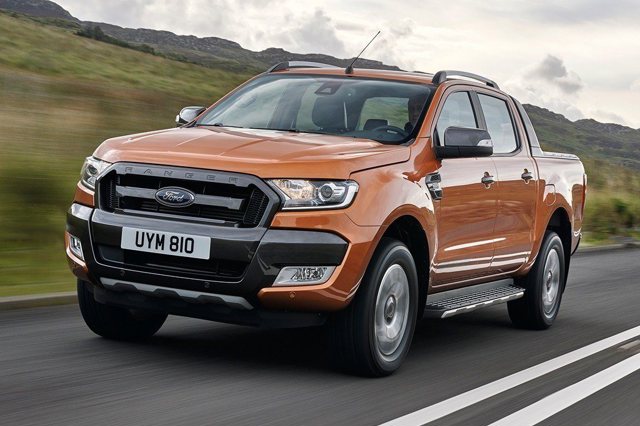
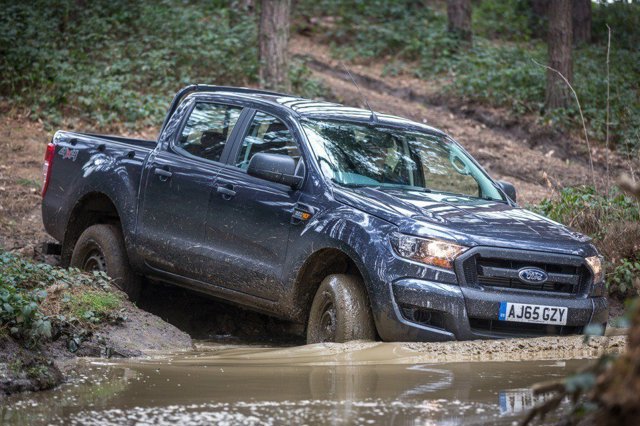

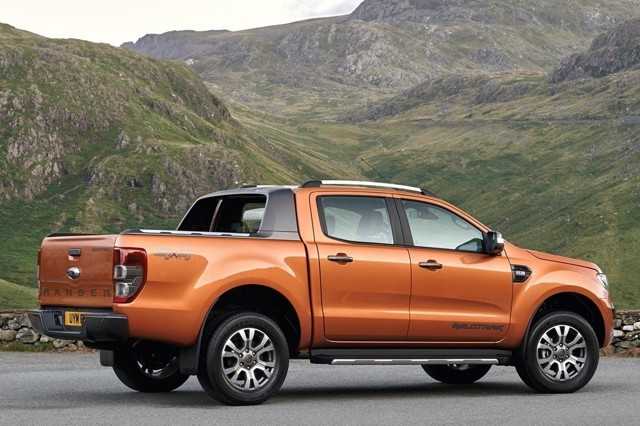
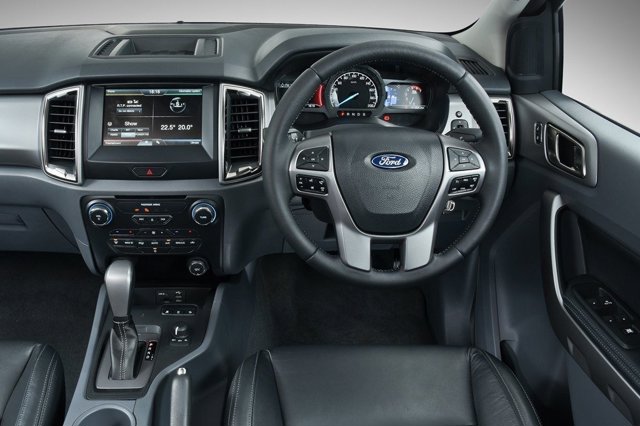
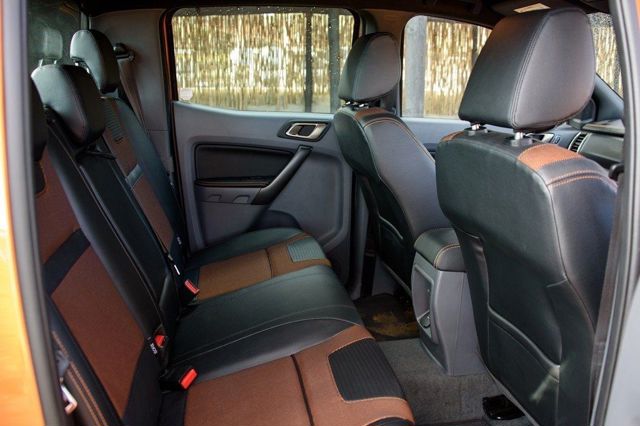

 Stylish and rugged looks, comfortable cabin, five star Euro NCAP crash safety rating, impressive towing ability.
Stylish and rugged looks, comfortable cabin, five star Euro NCAP crash safety rating, impressive towing ability.
 Lacks the refinement of its rivals, engines are noisy when pushed, 2.2 TDCi feels lethargic, reports of poor quality paintwork on 2013 models.
Lacks the refinement of its rivals, engines are noisy when pushed, 2.2 TDCi feels lethargic, reports of poor quality paintwork on 2013 models.
